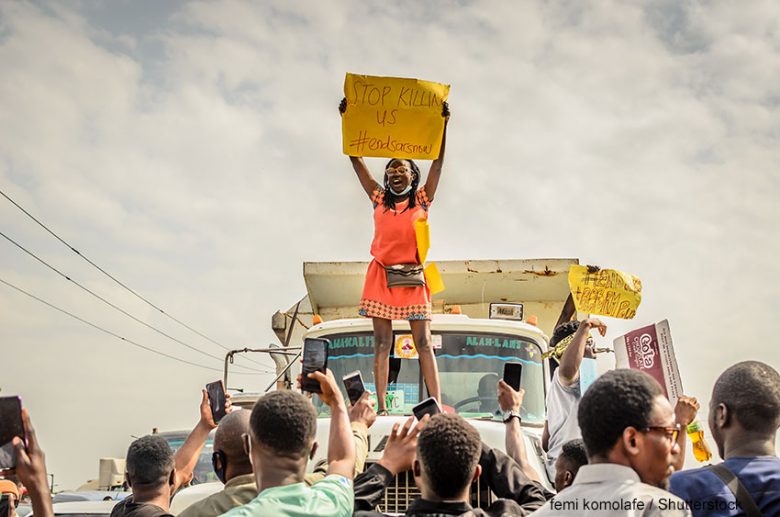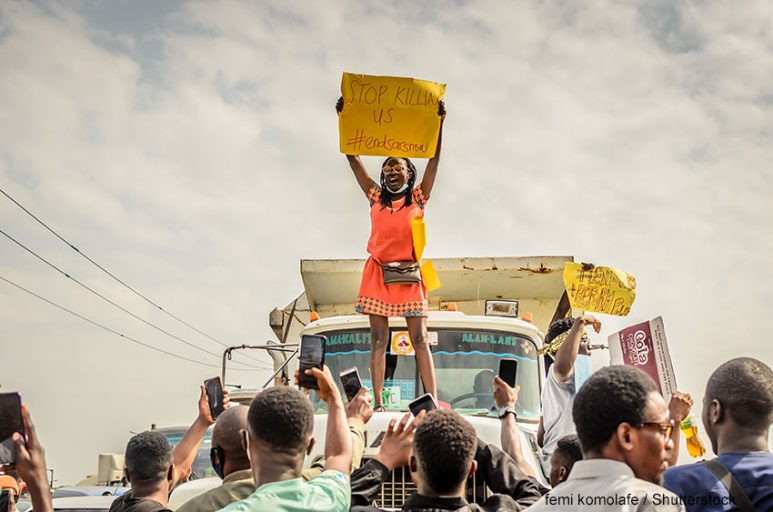By Shade Mary-Ann Olaoye
At the beginning of June Amaka* had to organize a social campaign for an upcoming event that the organization she works for was hosting. In order to have a wider reach, she thought of approaching a well-known Nigerian Twitter influencer who was recommended by one of her friends. During their discussion, she was caught by surprise. Due to the Twitter ban in Nigeria Twitter is only accessible through a Virtual Private Network (VPN) which means that trends are not possible to be reached. “People’s locations are scattered,” the influencer told her.
Following speculations that spread on social media and traditional media, the Nigerian Government, led by President Muhammadu Buhari, suspended Twitter. This “temporary ban” resulted after one of the President’s tweets which were said to incite and promote violence were reported and deleted from the platform and the President’s account was suspended for 12 hours. The tweet in question targeted and threatened pro-Biafra groups who are accused of attacks on the government. Currently, the microblogging app doesn’t function within the country and Nigerians have to rely on Virtual Private Networks to stay active and get their thoughts across. Regardless of the bypass provided by VPNs, the consequence of the Twitter ban is dire and long-lasting.

Twitter in Nigeria has fast become a relatively safe space and a marketplace for its estimated 40 million Nigerian users who fall within the categories of buyers, sellers of goods, and services. The affected population is also made up of Twitter influencers like Nkay who is also a social media manager, and brand influencer.
“It affected me personally because Twitter is my office”, she told Media Diversity Institute, reflecting on the fact that the Twitter ban will significantly contribute to the worsening unemployment crises within the country.
“There are no jobs out there and the ones we are trying to manage as young people, the government is snuffing it out. The government yanks this particular food out of my mouth, and I don’t know what to do,” she laments
How powerful is Twitter in Nigeria?
Within the country, Twitter has constantly been used as a tool to obtain social justice. In October 2020, one of the most notable protests in the recent history of Nigeria happened, this is the #EndSars protest. For weeks, the protest gathered online and offline momentum as young Nigerians scattered across the country took to the streets to demand that the Special Anti-Robbery Squad Unit (SARS) who have for long weaponized their power to torture, arrest unlawfully, execute and extort unsuspecting citizens be abolished. At that time, Twitter was used efficiently to document, spotlight, gather funds/resources for help, and cover in real-time the protest.
Within this protest, the marginalized community of LGBTQIA+ Nigerians who have for long suffered systematic discrimination and violence refused any form of exclusion and used Twitter as an instrument to trend hashtags such as #EndHomophobiainNigeria (before the protest), and #QueerNigerianLivesMatter during the protest.
Matthew Blaise, one of the leading voices in the gay rights movement within the country, talked to Media Diversity Institute and expressed their displeasure at the Twitter ban. To them, the ban will affect the Nigerian LGBTQ+ community very badly because Twitter helps with organizing, mobilization, finding family, and mutual aid.
“The banning of Twitter will disrupt how queer people seek self-sustainability, justice (within the community), safe space, and more”, they explain.
Speaking anonymously, a queer Nigerian stresses out that the Twitter ban has disrupted communities and community building for marginalized voices such as queer folks, women, and more. The power of Twitter to galvanize social activism for these people and its ability to foster interaction, seek opportunities, and raise much-needed funds to provide housing, food, and more is indeed one of the negative impacts of the Twitter ban.
Twitter so far has also been used by Nigerian women to aggregate their voices with hashtags like #MeToo, #JusticeForHinny #JusticeUwa. Hauwa Shaffi Nuhu, one of the conveners of the #ArewaMeToo movement, describes how the Nigerian feminist movement is loudest and more effective online.
“Every single large protest, every single large spin-off of activism from women that we have seen offline, started on Twitter. Because Twitter has been banned, this means that level of larger impact is going to be low because not everyone can afford a VPN and VPNs are not even sustainable,” she tells Media Diversity Institute.
For her, it is going to cripple the movement because most of this activism starts online, on Twitter.
What comes next?
When asked about the temporary ban, the Nigerian President in an interview gave a secretive answer. But from all indications, there is no saying how long the ban will last and there is not much for Nigerians left to do especially after the protest on June 12th, 2021 which was inclusive of other grievances.
To Nonso, the banning of Twitter, in the long run, is going to affect queer visibility in Nigeria because a lot of queer persons in the country are open and expressive about their sexuality on Twitter.
Twitter’s ban certainly impacts Nigerian’s livelihoods and freedoms. However, the government seems to target the media to a larger extent. According to The Guardian, the Nigerian government pushes for wider media regulations. A new amendment proposed by the current government targets media agencies and journalists who “could be liable to be fined and prosecuted for ‘fake news”.
It is quite clear that from here, there is not much to do or anywhere to go. Tweeting with VPN has made a lot of things difficult for Nigerians, and once again as a response, Nigerians protest online and offline using the hashtag #KeepItOn, hoping that their defiance will yield results.
* Not her real name
Photo Credit: femi komolafe / Shutterstock

